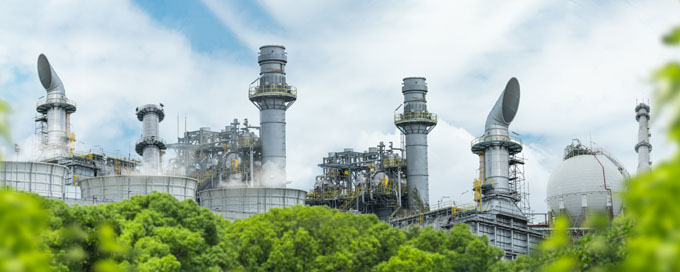
DNV is an independent assurance and risk management provider, operating in more than 100 countries, with the purpose of safeguarding life, property, and the environment. As a trusted voice for many of the world's most successful organisations, DNV helps seize opportunities and tackle the risks arising from global transformations.
DNV uses its broad experience and deep expertise to advance safety and sustainable performance, set industry standards, and inspire and invent solutions.

Morteza Tavari, Global Technical Director at DNV Inspection
Can you give us an overview of DNV Inspection and what sets it apart in the industry?
DNV Inspection is an independent assurance and risk management provider, meaning we support asset owners, operators, manufacturers and Engineering, Procurement, Construction and Installations services providers (EPCIs) with a range of integrated inspection and quality management services for their projects.
What truly sets us apart is our global reach, combined with our deep, multidisciplinary expertise. We operate in key manufacturing hubs and energy markets around the world, which allows us to be wherever our clients need us, whenever they need us. Our teams are led by qualified specialists who have extensive experience in sectors such as oil and gas, renewables, infrastructure, power, petrochemicals, and mining.
We offer an end-to-end inspection and quality assurance service model - from vendor qualification and expediting to fabrication yard inspection, site supervision, commissioning, in-service inspection, and RBI-based planning.
Our flexibility, technical depth, and ability to operate under global framework agreements position us as a trusted partner for both large-scale operators and local developers.
What services do DNV Inspection provide to the renewables and low-carbon industry?
Building on our proven capabilities in the traditional energy sectors, we have expanded to provide integrated inspection services to the growing low-carbon space, including offshore wind, hydrogen, carbon capture and storage, and transmission and distribution.
Using this expertise from across the energy mix, we can offer a suite of tailored solutions for every stage of a low-carbon project or asset lifecycle, including project assurance, vendor inspection, site inspection, in-service inspection or risk-based inspection (RBI) planning and management.
We also offer commissioning supervision services, electrical equipment inspection (including HV), and remote inspection technologies adapted for the offshore wind environment.
Our ability to provide assurance on complex, large-scale projects make us an essential partner for organisations navigating both established and emerging energy markets.
Why have you decided that now is the right time to move into the renewables market? And what are your ambitions in the space?
As the energy transition accelerates, the number of renewables projects around the world has exponentially increased, and with it the demand for inspection services in these new energies has grown in lockstep.
We formally entered the renewables and low-carbon market in 2021, building up a portfolio of successful inspection projects – including in carbon capture and storage (CCS), hydrogen, and ammonia – and this area now makes up a third of DNV Inspection’s sales.
Much of our success in green projects has been in offshore wind, which currently encompasses half of our business in the UK. We are also seeing strong growth in continental Europe and North Asia, and specifically in Spain and South Korea.
We have also recently expanded into the US market, especially the Northeast, where offshore wind and High-Voltage Direct Current (HVDC) projects are gaining pace.
We have strong faith in this market, and we understand what is required to help successfully deliver low-carbon projects on a global scale.
Our ambition is not just to participate but to shape the quality assurance landscape in renewables through risk-based methodologies that optimise inspections without compromising quality.
Our recent successes in various different areas within this industry underscore our growing commitment to the energy mix transformation, and we want to capitalise on our momentum to become a leader in this arena.
How does DNV’s global presence and industry expertise provide an advantage in supply chain management?
We are working in an era where supply chain complexity and project scale continue to increase, both within the traditional and low-carbon energy sectors, and DNV’s global presence allows us to take a whole systems approach towards supply chain management.
We have a vast network of specialists with decades of industry experience positioned around the globe, meaning we are always close to important manufacturing areas and project sites.
We currently operate in more than 22 countries under the DNV Inspection structure, with specialised regional teams for expediting, quality surveillance, documentation control, and compliance audits.
The supply chain is constantly evolving, and our wide-reaching presence allows us to be agile, providing timely inspections and quality assurance verifications wherever our clients operate. We help them to reduce delays and mitigate disruptions within the supply chain, while supporting them to deliver projects with confidence.
Trust is a major factor in the global supply chain. How does DNV help bridge that gap?
The supply chain in different markets and different geographic areas can be at varying levels of maturity, and with this comes a number of unique challenges.
This can be exaggerated if projects are particularly complex and are within industries dealing with the fledgling low-carbon supply chain, where it can be increasingly difficult to know where to purchase from and how to ensure quality materials and components.
Developers operating in this space need assurance that the components they use, particularly if they come from different regions, will seamlessly integrate and operate both safely and effectively.
However, with decades of experience in managing these issues, DNV has gained both familiarity with the supply chain and expertise in working on large and intricate energy infrastructure projects in some of the world’s most challenging environments.
DNV bridges the gap by working with suppliers and vendors from across the supply chain, irrespective of size or stature, to ensure their materials meet globally recognised standards and provide third-party verification to create confidence in the output of manufacturers in the eyes of developers or asset owners.
How does DNV help clients navigate supply chain bottlenecks to keep projects on track as they manage new dynamics in the low-carbon sector?
DNV’s latest Energy Transition Outlook report stated that the energy transition is now finally underway, but its progress can and will be impeded by supply chain bottlenecks.
DNV’s growth in the low-carbon space means it is well-suited to smoothing out the kinks and supporting the supply chain in flourishing. Through our expertise, we can identify any risks early, move swiftly to ensure compliance with international standards and help to create clarity on each side, all essential factors in building a healthy, functioning and diverse supply chain.
Our experts help clients to navigate supply chain bottlenecks and pinch points by enhancing supplier reliability with third-party assurance, assessing critical components so that they meet the required specifications before they reach project sites. Ultimately, this reduces delays to project timelines and eliminates the need for costly rework.
We support clients with expediting services when bottlenecks are anticipated, ensuring supplier progress is closely monitored and delays are mitigated early. In addition, we offer real-time inspection dashboards and, when needed, flash reports at critical milestones such as pre-dispatch to maintain full project visibility.
DNV has a strong background in oil and gas. How is that expertise being applied to the growing low-carbon energy sector?
Building on over five decades of experience through our legacy organisations in the oil and gas sector, DNV carries a wealth of project management expertise across into the low-carbon market. Our experts can assist developers in managing complex projects and be reactive to issues that could emerge in this still-developing landscape.
However, progress is never made in isolation. Delivering successful low-carbon projects requires strong collaboration across the industry and DNV actively works with partners, suppliers, and stakeholders to drive progress, applying best practices from oil and gas while adapting to the evolving demands of renewables, hydrogen, and other low-carbon solutions.
DNV uses transferrable skills honed over decades working in the oil and gas sector to meet the rising demands for renewables inspections and facilitate the safe and assured delivery of low-carbon projects.
We’ve adopted similar frameworks - such as Total Quality Assurance and Risk-Based Inspection strategies - into our renewables approach, allowing us to apply proven methodologies while still tailoring them to the specific risks of new energy technologies.
With increasing project complexity, how can companies proactively manage supply chain risks rather than reacting to them?
Proactively managing supply chain risks starts with early engagement and robust quality assurance. By conducting thorough vendor inspections, risk-based planning, and ongoing compliance checks, we can support customers in identifying potential issues before they escalate into costly delays.
DNV Inspection helps businesses take a forward-looking approach by leveraging data-driven insights, global expertise, and industry best practices to anticipate and mitigate risks. Our proactive inspection and risk management services ensure that suppliers meet quality standards, project milestones stay on track, and companies can adapt quickly to evolving challenges with the goal of minimising disruptions before they occur.
KeyFacts Energy Industry Directory: DNV l KeyFacts Energy: Q&A
 KEYFACT Energy
KEYFACT Energy